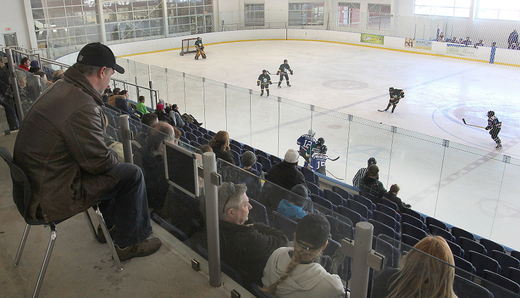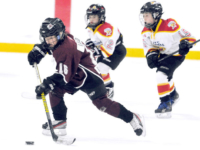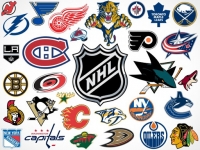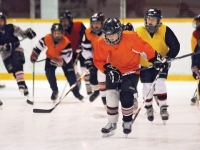Hockey is an intense, physical sport that attracts highly competitive players with a strong will to win. It’s no surprise then, that many of the parents of these players are just as competitive. After all, genetics combined with upbringing plays a major part in your personality. It’s good for parents to be passionate about their child’s success, but we have to make sure that we aren’t being overbearing.
Anyone who has played hockey knows those parents. The ones that are behind the glass every game yelling at the refs, berating the coaches, and even taunting players from the other team. When times are good, they can actually be kind of fun with their boisterous celebrations and seemingly unwavering support for the team. But when the team must face the slightest bit of adversity, watch out! All of the sudden they become the experts, often making a scene in the stands and embarrassing their child.
It’s important for parents to take an interest in their child’s hockey development, but they must remember that in the end, it’s just a game. If you are a hockey parent, think of how your behavior affects everyone around you.
The Players
No matter who a parent has interacted with during a game, practice, or scrimmage, their own child is going to be the most affected. It is highly distracting to have your mother or father yelling at you from the stands, especially in the middle of a stressful game situation. Even if they are encouraging their son or daughter, it can take his or her head out of the game and cause him to make mistakes on the ice.
It’s even worse when the parents are yelling at the refs or coaches. Nobody wants to be the kid that has the crazy, loud, offensive parents who are taking the game too seriously. This can embarrass a player mightily and will translate to poorer play. Now he doesn’t only have to worry about how his parents are acting but may also be thinking about his teammates and coaches and what they will think of him.
It isn’t fair for a player to have to apologize for the actions of his parents. Yes, refs make mistakes, and sometimes they are responsible for major game-changing momentum. This doesn’t give parents and excuse to humiliate their son or daughter in the middle of a game by yelling or swearing at the refs. Remember to take a breath and accept that it’s a game and that screaming isn’t going to change anything.
The Coaches
Coaches often get blamed for losses by unruly parents. It starts in the middle of the game when a parent doesn’t agree with a play or gets angry that his kid isn’t getting enough ice time. You may hear jaunts and jeers directed at the coach, as though he is 100% responsible for any less-than-stellar showing by the team. This doesn’t help matters at all.
Coaches are dedicated to developing players and helping the team win games. They wouldn’t be there if they didn’t want to see everybody succeed. Parents, in the heat of the moment, often forget this and want to take their own frustrations out on the coach. This can be a detriment to the overall performance of the team.
No coach wants to deal with angry parents either before, during, or after the game. It is a major distraction and can suck all of the joy out of it for them. Parents need to realize that the coach is there to help everyone perform better, and that they will be able to do their job best when they have calm, supportive parents rather than belligerent ones in the stands.
It’s perfectly acceptable for parents to ask to speak with a coach after a game or practice if they have concerns about their child’s development or playing time. But this should be done in a calm, understanding way that gives the coach the chance to explain his reasoning and thought process. This will be far more productive than any sort of yelling and screaming from the crowd could ever be.
Other Parents
Perhaps more than even the players and coaches, other parents in the crowd can get extremely fed up with the rowdy parents. They want to go to see their kid play a game, not watch an adult make a scene in the stands. They are aware that such behavior is a distraction for the players and the staff, and that it should not be tolerated.
Part of being a hockey parent is being around other hockey parents and getting to know them and their kids. If you become known as the obnoxious parents that take the game too seriously, they will not want to be around you. This can lead to negative consequences for your child as you may not be invited to certain events, and he might miss out on bonding time with his teammates.
If you are concerned about certain parents, it’s best to confront them when they’ve cooled down a bit. Explain that other people want to watch the game civilly and that it’s better for the kids if they remain calm in the stands. They don’t have to give up cheering or encouraging their child, but they should be respectful while they do so.
It’s Only a Game
As mentioned, the key takeaway is that hockey is only a game. Yes, some kids have a real shot at becoming stars, but yelling at the refs or coaches is not going to change that potential outcome. Most players will not reach professional status, and it’s important for them to have fun playing hockey instead of being stressed about their parents at all times.
Winning a game is fun, but not if you’ve been under pressure from your parents and feeling embarrassed the entire game. It’s better to lose a game gracefully than it is to be a bad winner, and parents to realize this just as much as players.






